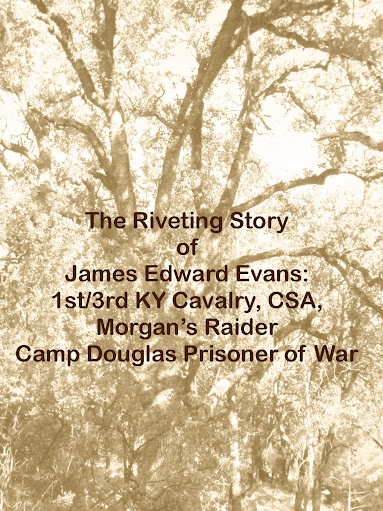 The Battle of Perryville, sketched by Mr. H. Mosler[i]
The Battle of Perryville, sketched by Mr. H. Mosler[i]“The South was holding on to an ideology that was more traditional. The North represented change. Corporations, commerce - not bad things - but different things and change was a threat.”[ii]
September 20 - October 3, 1862
General Braxton Bragg moved to occupy Bardstown, establishing his headquarters at Edgewood, the house our family knows as the home of Dr. Harry Spalding.[iii]
“Bragg was courageous, and at times imaginative, resourceful, and bold. But he was never patient, either with his men or with the enemy, and he lacked that imperturbability and resolution so necessary in field commanders. Handicapped by poor health, he had no real taste for combat. And he was not lucky. Nor did he have the ability to inspire confidence in his subordinates. Notoriously inept at getting along with people he disliked, he simply could not win the loyalty of his chief lieutenants. He lacked what has been called the common touch. By training and by preference a regular army man, contemptuous of volunteers and a democratic military establishment, he was unsuited to lead an army composed overwhelming of individualistic citizen-soldiers. A mediocre tactician, he seemed unaware of the technological changes that had outdated pre-war assault tactics and strengthened the advantages of defensive combat.”[iv]
The war was had become a part of the daily lives of Southerners. Even women, who were expected to refrain from political arguments and public speaking, publicly lent their pens and voices to the support of the war.
"I was never a Secessionist, for I quietly adopted father's views on political subjects without meddling with them. But even father went over with his State, and when so many outrages were committed by the fanatical leaders of the North, though he regretted the Union, said, ‘Fight to the death for our liberty.’ I say so, too. I want to fight until we win the cause so many have died for. I don't believe in Secession, but I do in Liberty. I want the South to conquer, dictate its own terms, and go back to the Union, for I believe that, apart, inevitable ruin awaits both. It is a rope of sand, this Confederacy, founded on the doctrine of Secession, and will not last many years - not five. The North cannot subdue us. We are too determined to be free. They have no right to confiscate our property to pay debts they themselves have incurred. Death as a nation, rather than Union on such terms. We will have our rights secured on so firm a basis that it can never be shaken. If by power of overwhelming numbers they conquer us, it will be a barren victory over a desolate land. "
~ Sarah Morgan Dawson[v]
October 1862
J. Russell Butler’s 3rd Kentucky and D. Howard Smith’s 5th Kentucky regiments occupied Lexington.[vi]
James Edward Evans had become a member of the 3rd when the 1st was reorganized.
“3rd Cavalry Regiment was organized during the summer of 1862. In October the 1st Kentucky Cavalry Regiment merged into this command and at times was called the 1st (3rd) Kentucky Cavalry. It was assigned to Buford's, T. Harrison's, J. W. Grigsby's, J. S. Williams', and J. H. Lewis' Brigade, and skirmished in numerous actions in Tennessee, Kentucky, and Georgia. Later the unit was active in the Atlanta Campaign, the defense of Savannah, and the campaign of the Carolinas. It surrendered with the Army of Tennessee in April, 1865. The field commanders were Colonel J. R. Butler, Lieutenant Colonels Jack Allen and Jacob W. Griffith, and Major J. Q. Chenoweth.”[vii]
“The 1st Kentucky Cavalry was mustered into service in October 1861, under the command of Col. Benjamin H. Helm. By the summer of 1862 its numbers were so depleted that it was reorganized and parceled out to other Kentucky regiments. At this time, Gibson Taylor--a 3rd lieutenant in the 1st Kentucky--was transferred into the command of John Hunt Morgan, under whom he was ‘noted for gallant and meritorious conduct.’”[viii]
October 3, 1862
Confederate General Braxton Bragg vexed with the scant numbers volunteering, sought a means by which he could conscript the unwilling male population of Kentucky into his army. Bragg hastily orchestrated the inauguration of Richard Hawes as the Provisional Governor of Kentucky in the occupied state capitol of Frankfort. The plan was foiled when a celebratory dinner after the ceremonies was interrupted by the approach of Union cavalry and artillery. The Provisional Government was again forced into exile in Tennessee.
October 4, 1862
Buford’s Brigade, along with the 3rd and 5th Kentucky Calvary regiments, was ordered to Versailles.[ix]
Meanwhile, General Whereton's Confederate Calvary, including Captain John Hunt Morgan's "Lexington Rifles" engaged the advance guard of Union General Don Carlos Buell's army at Bardstown. Buell's forces were driven back towards Louisville. Three days later, an Indiana regiment was surrounded and forced to surrender.
“They were about four miles from us when we heard of them Col Wharton ordered us forward immediately in a gallop We very soon made the distance and found them sure enough Their cavalry, four regiments —about two thousand— drawn up in line of battle in an old field and immediately across the road. Their infantry and artillery was on the left. My company was in the advance we charged them immediately without forming they let us get within ten steps of them and then turned loose a volley right in our faces this did not stop us a second we gave a yell you could hear for miles and run over and scattered them in every direction. This was the most complete victory I ever saw we killed forty or fifty of the enemy without the loss of a man. This was very strange considering we were fighting hand to hand. I captured a good horse and enough blankets for Ans and myself all the winter.”
Much needed rain was falling at last, slowing the Union troops marching along Bardstown Road and the path of Cox’s Creek.
“On October 4, Gilbert’s corps turned eastward. Sheridan’s division marched onto a muddy and slippery Bardstown Pike, skirmishing and marching through the rain to support Crittenden in case the Confederates decided to fight for the town, while others moved up Cox’s Creek parallel to the Pike.”[xi]
October 5, 1862
Buford’s Brigade now contained 2,000 cavalrymen and was composed of Butler’s 3rd Kentucky Regiment, H. Smith’s 5th Kentucky Regiment, and Grigsby’s 6th Kentucky Regiment.
When the 3rd and 5th arrived in Versailles, James Edward Evans and his comrades were ordered to patrol roads leading north-west toward Frankfort, and westward toward the Kentucky River.[xii]
“Union troops were in possession of our house and had ordered my mother to prepare a meal for them. She appeared to obey, and took me and a negro woman to the outdoor kitchen and from there escaped through a window, and the three of us spent the night in hiding, in a turnip field.”
October 7-8, 1862
The Battle of Perryville began as a skirmish over a few precious pools of much needed water.
“For months, a severe drought affected the area. As Union and Confederate forces maneuvered around Perryville, both man and horse suffered intensely for want of water. Only stagnant pools were available for the thousands of thirsty soldiers. After the Union army left Louisville, some of the first casualties were caused by this dry, hot weather. One Union colonel wrote, ‘Today we passed two men laying on the roadside having died from sunstroke . . .’ The heat was unbearable, and Perryville’s Chaplin River was nearly dry.
On the night of October 7, the Southerners moved an advance unit of Arkansas troops between the dried waters of Bull Run and Doctor’s Creek, located west of town. When Union forces reached the area, a reconnaissance mission proved that small pools of water were available in Doctor’s Creek. The Union command ordered the water, and the heights overlooking it (called Peter’s Hill), secured. At 3:00 a.m. on October 8, Federal troops under Brigadier General Philip Sheridan moved on Peter’s Hill, driving back the Arkansas soldiers. The Battle of Perryville had begun.
On October 8, 1862, Watkins and 18,000 Confederates clashed with 20,000 Union troops on the hills outside of Perryville. Nearly 7,500 soldiers were killed and wounded in Kentucky’s largest Civil War battle. The Confederate failure to attain a decisive victory kept Kentucky in Union hands for the remainder of the war, stands as the High Water Mark of the Confederacy in the Western Theater, and marked the last major incursion of Confederate forces into the Commonwealth of Kentucky.” [xiv]
“Such obstinate fighting I never had seen before or since. The guns were discharged so rapidly that it seemed the earth itself was in a volcanic uproar. The iron storm passed through our ranks, mangling and tearing men to pieces… Our men were dead and dying right in the very midst of this grand havoc of battle."
~ Private Sam Watkins, CSA
The aftermath of the battle brought forth only greater chaos. Both Southern and Northern leadership crumbled.
While the Confederates had driven the Union off and were now in control of the coveted water supply, Braxton Bragg was deeply rattled by the loss of so many lives. In his report Bragg reflected:
“For the time engaged the severest and most desperately contested fighting within my knowledge.” [xv]
In dismay over their failing invasion of Kentucky, Braxton Bragg and Edmund Kirby Smith began a retreat into Tennessee.
U. S. General Don Carlos Buell was replaced by Gen. William Rosecrans.
“[It] makes one feel sad to think of such men being sacrificed amid the horrors of the battle field; and if such a noble army as is now in the field had only all learned that all wars and fighting are wrong and freedom the inalienable right of all, these scenes would never have been and doubtless this country remained a united people.”
~ Letter written by Sophia Jones, a young Quaker [xvi]
ENDNOTES
[i] Harper’s Weekly, November 1, 1862
[ii] "For God and Country: The Role of Religion in the Civil War" An Online Chat With Author Michael Aubrecht http://www.civilwarhome.com/religionincivilwar.htm
[iii] Hibbs ,Dixie “ Bardstown: Hospitality, History and Bourbon,” Chap. 3, pages 75 -76.
[iv] McWhiney, Grady. “Braxton Bragg and Confederate Defeat,” Volume I 1969.
[v] Dawson, Sarah Morgan. “Confederate Girl's Diary,” page 32.
[vi] Hafendorfer, Kenneth A. “They Died By Twos and Tens” 1995 p. 553.
[vii] NPS records http://www.itd.nps.gov/cwss/
[viii] Thompson, Orphan Brigade, p. 996.
[ix] Hafendorfer, Kenneth A. “They Died By Twos and Tens” 1995 p. 665.
[x] Letter from M. A. Harvey to his niece Eva, University of Notre Dame Rare Books and Special Collections http://www.rarebooks.nd.edu/digital/civil_war/letters/harvey-ma/
[xi] Noe, Kenneth W. “Perryville: This Grand Havoc of Battle,” 2001, p. 121.
[xii] Hafendorfer, Kenneth A. “They Died By Twos and Tens” 1995 p. 667.
[xiii] Johnson, Ella“ Grandma Remembers” 1928
[xiv] Historic Perryville Official Web Site http://www.perryville.net/
[xv] OR , Volume XVI/1, S22 Series I
[xvi] Letter written to Mary Bettle by Sophia Jones, University of Notre Dame Rare Books and Special Collections, http://www.rarebooks.nd.edu/digital/civil_war/letters/bettle/





No comments:
Post a Comment